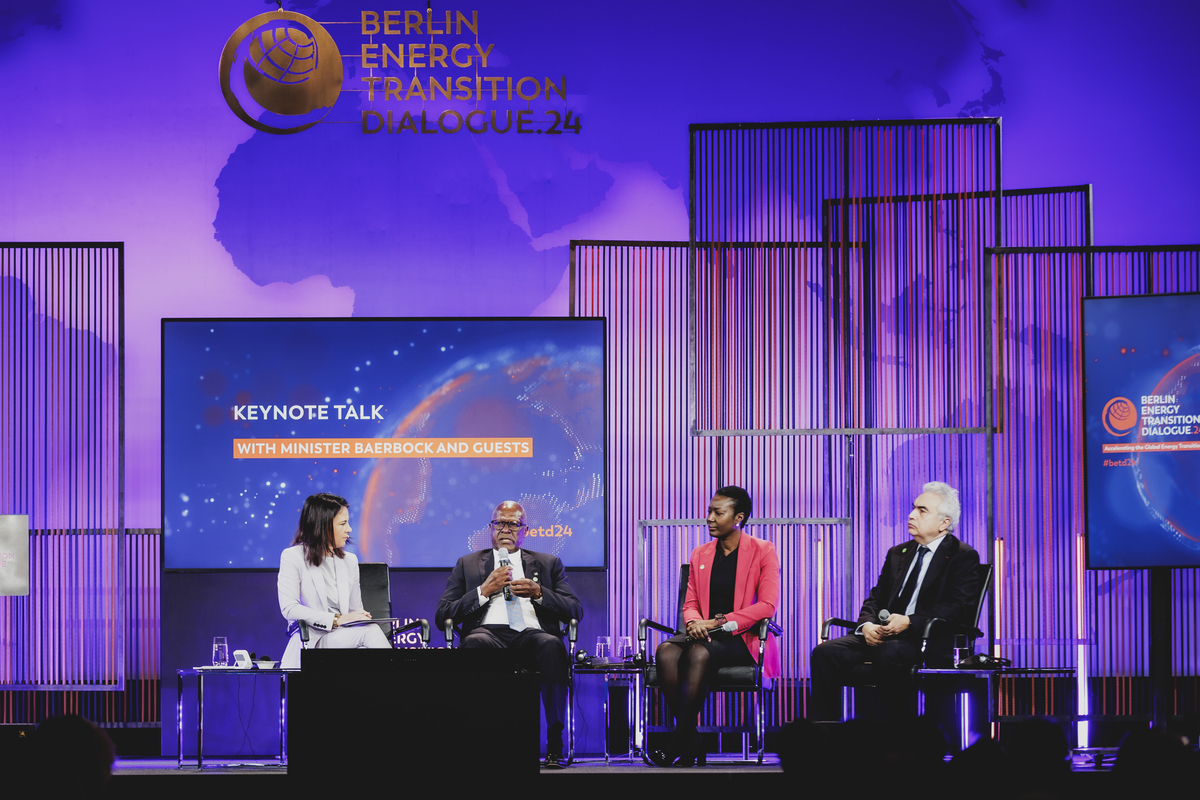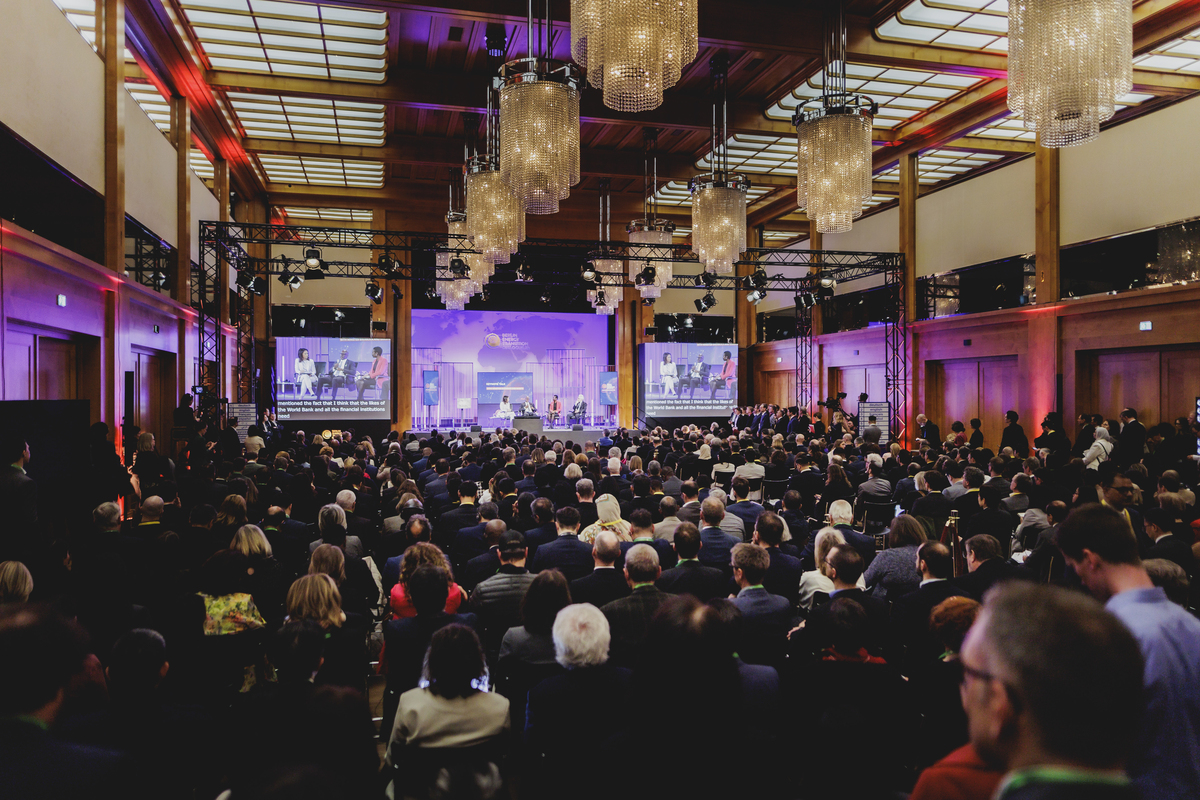BERLIN – Global energy experts and policymakers emphasized the critical need for advanced economies to allocate significant investments towards the development of clean energy solutions in developing countries at the 10th Berlin Energy Transition Dialogue (BETD) in Berlin on March 19.

From L to R: Federal Foreign Minister of Germany Annalena Baerbock, Minister of Mines and Energy of Namibia Tom K. Alweendo, Managing Director of Kowry Energy Services Ndiarka Mbodji, Executive Director of International Energy Agency Fatih Birol. Photo credit: BETD press service.
The two-day conference gathered global energy experts and policymakers from over 75 countries to discuss strategies for tripling the new global renewables capacity target set during the 2023 United Nations Climate Change Conference in Dubai, or COP28.
Kazakhstan’s delegation, headed by Vice Minister of Energy Sungat Yessimkhanov, will participate in the Sustainability Standards in Green Hydrogen panel session on March 20, addressing Kazakhstan’s role in green hydrogen development.
Federal Foreign Minister of Germany Annalena Baerbock said the world must ensure that climate finance is affordable and accessible to all developing countries, including those in Central Asia.

BETD gathered global energy experts and policymakers from over 75 countries. Photo credit: BETD press service.
“We see today that developing countries, on average, have an interest rate of 16%, often four times as much as industrialized countries. So all the investment is obviously automatically going to the industrialized countries, even though it would need these investments in other places. This is why climate policy is more than just energy. It’s also a push for the reform of financial institutions,” said Baerbock.
“Finance and money alone doesn’t help either,” she added. “It doesn’t bring the projects, especially the integrated ones, to the countries where we need them. For the countries which do have a lack of access to the right technology or natural resources, we have to see how we can bring these projects on the ground. Therefore, here in Berlin, we are not talking about a one-size-fits-all solution. We’re here to find ways to check out the different challenges to make energy transition possible everywhere. This means we are here to listen and to learn from each other. Because this is the only way how we can turn renewable energy into a success story for the whole world,” said Baerbock.
Fatih Birol, executive director of the International Energy Agency (IEA), also supported the idea that it is important to ensure that funds reach the world’s regions, given that emissions represent a global issue.
“All this increase from one to two trillion for clean energy for energy investment took place in advanced economies and China. If you look at renewable energy investment in Africa, Latin America and other Asia, it was flat. Emissions will come from that [region] as well. Emissions don’t have a passport. So it is in advanced economies’ own interest to support clean energy investment in developing countries,” said Birol.
“Advanced economies have a historical responsibility for today’s climate problem. What has caused the climate problem is not the emissions going to atmosphere today. For 100 years, emissions went to the atmosphere, and a big chunk of those emissions came from advanced economies and China,” he added.
In fact, Kazakhstan has felt the burden of emissions despite not being a significant contributor to them. If the world fails to limit the growth of global temperatures to within 1.5 degrees Celcius, Kazakhstan and Central Asia could face a temperature increase of 2.5 degrees, posing significant challenges for the region.
In the meantime, developing countries should find ways to diversify their economies, according to Birol.
“There are many countries whose economies are indexed to oil and gas revenues. If I were them, I would start to diversify my economy because the clean energy transition is happening and happening fast. In 5-10 years of time, which is very short for the energy sector, the need for oil and gas will not be as strong as today. Therefore, not only the amount of oil and gas demand that will be less, but there will be a downward pressure on the prices, therefore, on the revenues for these countries,” said Birol.
With Kazakhstan aiming to double the economy to $450 billion by 2029, the diversification of the economy and increasing the inflow of external and internal investments have been set as priority tasks.
IRENA report
The International Renewable Energy Agency (IRENA) report, revealed at the BETD, highlights that although global renewable capacity in the power sector grew by a record 473 gigawatts last year, adding 473 gigawatts to the global energy mix, the gap between actual progress and the development required to achieve long-term climate goals has continued to grow.
According to IRENA, an average of almost 1,100 gigawatts of renewable capacity must be installed annually by 2030—more than double the record set in 2023. Annual investments in renewable power generation must surge from $570 billion in 2023 to $1,550 billion on average between 2024 and 2030.
The same report shows that despite considerable renewable potential, developing countries have received disproportionately low levels of investment. Although energy transition-related investments have reached a record high, exceeding $2 trillion in 2023, emerging markets and developing economies accounted for just over half of global investments. 120 developing nations attracted only 15% of global renewable investment, with Sub-Saharan Africa receiving less than 1.5% despite being home to the highest share of energy-deprived populations.
According to IRENA Director-General Francesco La Camera, developing countries, including those in Central Asia, need to fast-track expansions of grid infrastructure, legal framework, policy, and institutional capacity to attract more investment in the clean energy sector.
“As for countries with natural reserves, we cannot ask them to destroy the economy, but they have to transit. For example, they can use the gas to produce hydrogen. In the meantime, they have to find the resources to make the change happen,” said La Camera.
“I’ve been three days ago to Azerbaijan. They are going to raise their targets for renewable energy in their own system to 30%. That is not very high, but it’s still something for oil and gas countries. Also, they made an agreement with the European Union for the investment on onshore offshore wind. IRENA, with its financial platform, the ETAF (Energy Transition Accelerator Financing), funded a 900-megawatt project in Uzbekistan: three different solar panels – $1 billion project investment. So it’s possible to do it, but we need all the institutions without any confusion of what they have to do. They have to find solutions day by day, having in mind that the structures should be there: the infrastructure, the legal environment, the right policies, the institutional capacity and the skilled workforce,” said La Camera.
Kazakhstan is investing heavily in clean energy projects and has announced several initiatives to achieve net-zero emissions by 2060. The country is developing new clean energy projects such as the Hyrasia One project, a green hydrogen production complex in western Kazakhstan and the construction of its first one-gigawatt wind power station by the United Arab Emirates Masdar renewable energy company.

